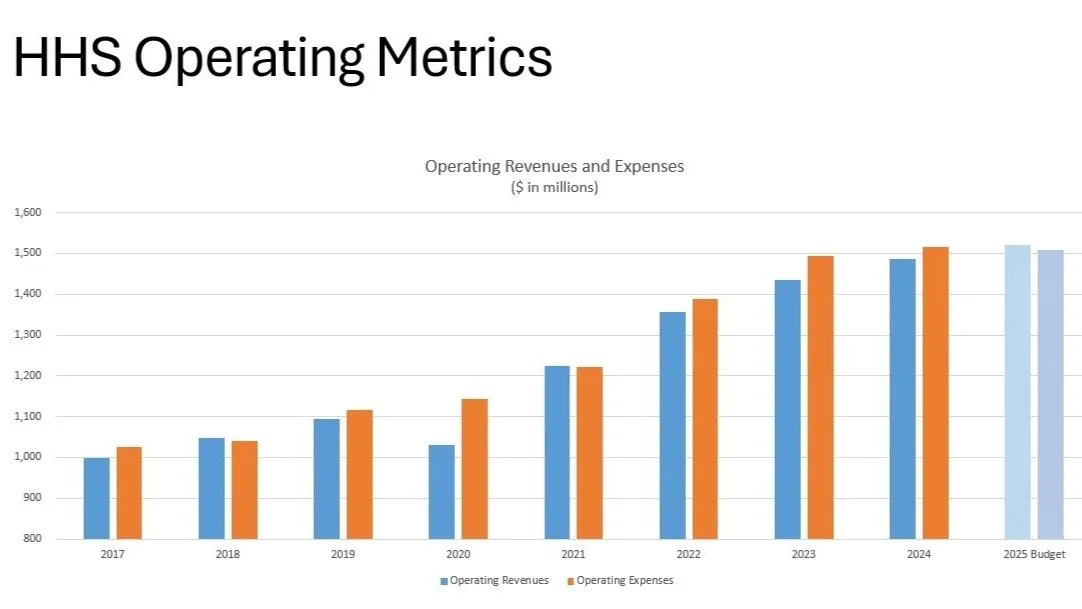Statement on HHS Financials and the Hennepin Governance Vote
Today, the Hennepin County Board will consider a Board Action Request (BAR) to dissolve the HHS corporate board and resume governance authority over the hospital system This action was introduced by the County Administrator and comes after over 18 months of work and analysis by County Administration. This statement will take a deeper dive into the financial situation at HHS in order for the public to be aware of the dire financial reality, as well as to make clear the County Board’s deep dedication to ensure there is no longer a risk of closure for the hospital.
In 2005, the Legislature enabled the establishment of HHS as a distinct legal entity and subsidiary to Hennepin County Government. Within this legislation, several “reserved powers” were outlined. Today’s BAR utilizes the reserved power under Minnesota Statutes § 383B.908, subdivision 7, that allows the County Board to “retain the right to dissolve the corporation, reorganize the corporation, or remove the entire corporate board in order to resume management of Hennepin County Medical Center upon a two-thirds vote of the entire county board.”
The BAR can only prevail this afternoon with a supermajority of the County Board. Should five or more Commissioners vote in favor, then the seven of us would become the membership for the HHS Board. HHS will remain a distinct legal entity and subsidiary to Hennepin County Government, and the hospital will remain open and continue to serve its important mission to patients, workers, and the community. As the HHS Board, County Commissioners will have access to financial data not previously provided, as well as needed operational oversight to improve patient outcomes, strengthen workforce relationships, and ensure broader community engagement.
How Much Hennepin Funds HHS
Since joining the County Board in 2019 and the HHS Board in 2020, I am very proud of the County’s material increased support of HHS. I believe wholeheartedly in Hennepin Healthcare System’s mission and impact. The County’s total financial contribution spans from direct funds for uncompensated care to purchased services to capital needs and more.The overall increase in funding over time and since 2020 is notable unto itself, especially because this is the same time period where hospital funding increased at a systemic level (see figure 1).
Figure 1
In 2024 alone, Hennepin County invested a total of $227.8M to HHS: $28M in budgeted uncompensated care, $10M in supplemental uncompensated care, $33.1M in Capital expenditures, $4.8M in IT expenses, $4.2M for additional workforce health insurance expenses, $121M via Hennepin Health (County-owned Managed Care Organization), and $26.7M in county purchased services from HHS (see figure 2). Additionally, the County’s relationship with HHS offers financial benefits not represented in the chart — such as favorable reimbursements for length of stay, steeply discounted access to pharmaceuticals, and subsidized use of County owned and maintained facilities.
Figure 2
Lastly, HHS began receiving significant funds in 2022 through the Medicaid Directed Pay program, which is only possible because HHS is a subsidiary of the County. While we do not yet have 2024 numbers, HHS received an additional $139.6M in 2023 and $89.1M in 2022 through Directed Pay (see figure 3). However, even with significant increases in government support, HHS has still experienced an operating net loss for seven of the past eight years.
Figure 3
HHS Operating at a Loss
HHS operating metrics (see figure 4) show that expenses have risen nearly 50% since before the COVID-19 pandemic, and that expenses continue to be higher than revenue. This has meant Hennepin County has increased our share of funding to HHS by nearly 100% to make up for shortfalls and increased uncompensated care costs. It is clear by looking at public hospitals across the nation that this is a growing issue. However, that does not mean we should allow this financial situation to continue. Hennepin is leading the charge on how we approach, fund, and govern public hospitals in this difficult time for healthcare.
Figure 4
In 2025, HHS has informed Hennepin of financial strain that far exceeded the County’s capacity, such as support to fulfill payroll, cash advances, and a request for an additional $30M loan. These losses are not sustainable, and anticipated state and federal funding cuts have accelerated our concerns. For the last 18 months, while increasing its financial support of HHS, the Hennepin County Board has also worked to receive timely financial information from HHS Board and management in order to ensure financial sustainability and good governance.
Recent discussions have led us to the conclusion that ensuring the hospital remains open requires direct operational oversight and expedited decision-making by the County.
The Solution and Next Steps
HHS is a critically important asset to our county, region, and state. We must ensure its continued operations.
In order to address the current financial crisis, the County Board is considering a BAR to take necessary, proactive steps to provide immediate oversight and support during this critical period, stabilize HHS’s financial condition, and ensure its long-term vitality. Should it prevail, the BAR will allow Commissioners the adequate oversight and transparency, while the County Board develops a sustainable path forward with HHS executive leadership.
The BAR outlines the establishment of a transition team, which will work closely with HHS executive leadership and staff to navigate this transition. The primary objectives being continued operations of HHS and developing a sustainable financial plan into the future.
This is just the beginning of ensuring Minnesota’s last public, safety-net hospital remains open and continues to serve residents. I am committed to regular updates and open communication to ensure transparency and collaboration. It is clear that health access and hospital management are needed across the country and state, so I look forward to being actively engaged with Legislators to develop solutions for the unsustainable financial pressures on healthcare — and its devastating impacts for health access, patient outcomes, and workforce stability.




